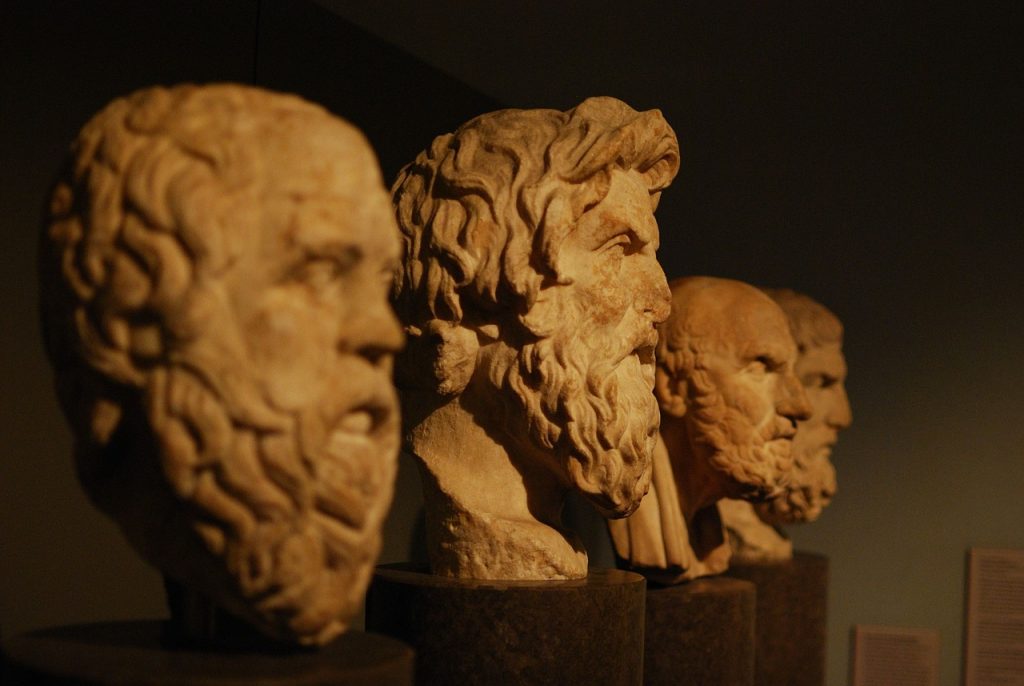Greece is the cradle of many things such as theatre, democracy, and philosophy. The name “philosophy” comes from the Greek language, meaning “love of wisdom”. Ancient Greek philosophers also shaped Western philosophy back then.
Greek philosophers helped an understanding of how the universe works and how we can understand life through our logic. For sure, such an understanding was quite new considering the old tradition of mythology narration. The earliest philosophers influenced theories in positive sciences as well.
We prepared the list of Greek philosophers for you. You’ll find the most famous Greek philosophers and the way they contributed to philosophy and sciences below.

Pre-Socratic Period
When one speaks of an ancient Greece philosopher, Socrates comes to mind. Before Sokrates, certain other philosophers and thinkers had ideas about the universe. Let’s get to know about them.
Thales
Thales of Miletus (c. 624 BC – c. 546 BC) was an astronomer, mathematician, and ancient Greece philosopher. He is known for his declining mythological explanations about the universe and nature. Instead, he tried to explain natural phenomena with certain hypotheses and theories. His famous theory was that water is the originating principle of nature.
Thales is also famous for predicting a solar eclipse. In addition, he devised five theorems in geometry.
Pythagoras
Pythagoras of Samos (c. 570 BC – c. 495 BC), is the founder of the Pythagoras theorem that contributed a lot to geometry. Besides being a mathematician, he was also a great philosopher.
He also founded a school in around 530 BC in the Greek colony of Croton, in southern Italy.
Metempsychosis and the “harmony of the spheres” were other theories by Pythagoras. It proposed that stars and planets move through mathematical equations. So, these correspond to musical notes that make an inaudible symphony.
Anaxagoras
Anaxagoras (c. 500 – c. 428 BC) focused on nature, and he produced theories regarding the formation of the universe. He theorized that the universe occurred not only by the four elements but by an infinite number of particles.
He also discovered the true cause of eclipses. Anaxagoras was also one of the Ancient Greek philosophers who rejected mythological explanations about the universe. As a result, he was banished from Athens.
He also developed the theory of “everything-in-everything”. He proposed that nous -intellect or mind- was the cause of the cosmos.
Empedocles
Empedocles is another ancient Greece philosopher who founded a medical school. He’s known for his theory of roots which are air, water, earth, and fire. In addition, he adds Love and Strife as active principles that separate or bring the elements together. In this way, he influenced later medicine, religion, and philosophy as well.
Classical Period
Let’s now look at Socrates and other influential ancient Greek philosophers of this period.

Socrates
Socrates (469- 399 BC) is one of the famous Greek philosophers who influenced many people and areas of thought. He’s also considered one of the founders of Western philosophy.
He believed that the desire for happiness is the motivation of human choice. His famous Socratic method is another important contribution to philosophy. In this method, arguments and dialogues take place to understand the truth.
Unfortunately, he was tried and convicted because of criticizing religion and corrupting the youth in Athens. However, he killed himself instead of being exiled.
Plato
Plato (428-348 BC), an ancient philosopher, was a student of Socrates, and teacher of Aristotle. He founded the Platonist school of thought and the Academy.
His idea was that the soul had functions of reason, emotion, and desire. He wrote the influential book on politics, The Republic. He addressed the ideal and utopian society in this book. He was also a critic of democracy, like Socrates.
Aristotle
Aristotle (385-323 BC) was born in Stagira and was the founder of the Lyceum and the Peripatetic School of Philosophy. He is also one of the classical philosophers.
Aristotle studied different subjects including physics, politics, government, and science. For the first time until his period, he developed the field of formal logic.
Today, his writings and arguments are still being studied in academic studies.
Epicurus
Epicurus (341-270 BC) was the founder of Epicureanism and believed in the infinity of the universe. He also claimed that humans don’t have control over their fate. Although he wrote many works, they did not survive until today.
He also rejected Plato’s teaching, and developed his school in Athens: “The Garden”. Epicurus did not believe in the afterlife as well. Epicureanism claimed that philosophy aims are to help people have a tranquil and happy life. Such life is characterized by ataraxia and aponia; peace and absence of pain, respectively.
The earliest philosophers influenced the modern sciences we know today. We hope you can find all your needs in our article about Greek philosophers.




